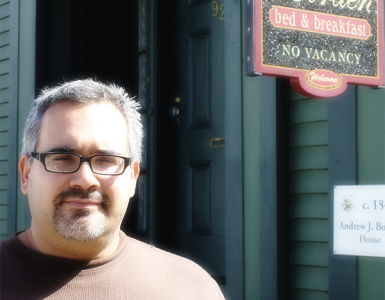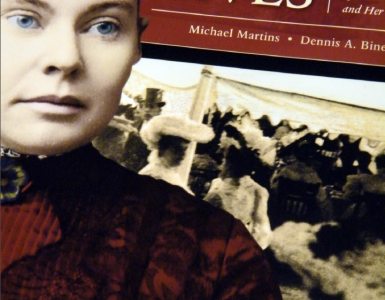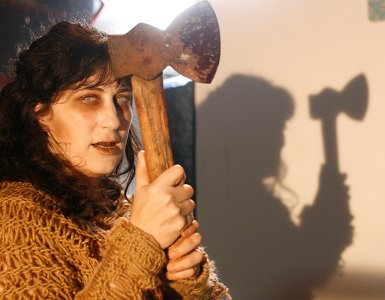by Richard Behrens
First published in November/December, 2007, Volume 4, Issue 4, The Hatchet: Journal of Lizzie Borden Studies.
What was the genesis of this project?
Gayle Stahlhuth, the artistic director of the East Lynn Theater Company of Cape May, New Jersey, commissioned it. She and I had known each other as actors in New York, we had done different pieces at various festivals, and we remained in touch over the years. It was her suggestion that I write something about Lizzie Borden and I was immediately taken aback because all I knew was that Lizzie took an axe and murdered her parents. And I thought, I don’t want that energy in my psyche, I don’t need a murderer living inside my head. So my reaction was no, but thanks for asking. Gayle called me up a few weeks later and asked me if I had thought about it and I said, “You’re really serious? Let me do some reading.” So I started doing some research and then one day Lizzie started speaking. I would go to the computer and write down whatever she said and when she would stop, I’d stop writing. And then I’d go about my life and she would start speaking again. And I didn’t feel any bad energy, no ominous presence that would harm me. So I thought, I do want to do this. And I believe that once Lizzie realized I’m friendly, that I wasn’t going to exploit her or abuse her, that I actually wanted to hear what she has to say, I feel like she was guiding me, because she knew I came in peace.
One interpretation of the title of your play, Lizzie Borden Live, is to pronounce it “live” (rhymes with “give”). That would emphasize how you are bringing her back to life.
In all the previous portrayals, like the Elizabeth Montgomery movie, you’re not inside of Lizzie. You’re still the voyeur. I’m trying to bring her alive on stage, the good, the bad, and the ugly. Gayle said it was like Lizzie was finally having her day in court where she’s able to speak her truth. She’s able to give her side of the story that she never did. There’s so much more to her than whether she actually did the murders or not. She’s a fascinating woman even without the murders, especially in her day and time. She was very forward thinking, she went to the theater, did the European tour, etc. Her father was very happy living in that house instead of up on the Hill, but Lizzie wanted to be up there. She loved fine things, beautiful things. She spent $3,000 on her garage alone, which was unheard of in those days. She certainly is a fascinating woman.
Can you tell us about the research you did preparing for this play?
I knew I wanted the research to be as thorough as possible. I wanted to go directly to the primary source material so that’s when I downloaded all 1,930 pages of the trial from the Internet, then I read her inquest testimony, her will, anything I could find that was first person, her actual documents. Then by accident I ran into Doug Hughes (the Broadway directory of Doubt and Inherit The Wind) and by coincidence he was in the original Lizzie opera when he was a kid. So he’s a Lizzie fanatic and he said, “You have to read Edmund Pearson, because he’s the first true crime writer who wrote all about the Borden case.” I also used the Lizzie Borden Sourcebook that has some of the original newspaper articles. I tried reading books by people like Arnold Brown but I wasn’t so much interested in the theories. Those get very tiresome after a while because you really can’t prove anything.
Then I went to Fall River a few times and, by coincidence, it turned out that my director grew up there. We drove up French Street to Maplecroft and got out of the car and we were just walking back and forth and I started to go into the backyard and my director said, “Jill that’s breaking and entering! You can’t do that!” Then out walks Robert Dube and I say, “I’m writing a play about Lizzie Borden!” “Oh yeah,” says Dube, “she’s guilty, and she did it, I know!” And I say “no, no, no” and he says, “What do you mean no no no?” So, I sweet-talked my way in there and I found out later that he never lets anyone in there. So inside the house’s first floor there’s Lizzie’s portrait hanging on the wall and there’s maple leaves carved in the banister and there’s the main living room and I looked straight ahead and I see this wallpaper and I say, “What is that?” because I know it was hers. And he says, “That’s the original wall paper.” So, he allowed us to take pictures of the wallpaper, which is the original dark blue with berries and flowers. The feeling I got from Maplecroft was very calm, very peaceful, and very solid. It’s very well maintained inside. I got this feeling for her from the house, so I decided to put my play in Maplecroft and center it around 1905 when Emma left. I felt like Lizzie was guiding us. She didn’t want us to go to the murder house right away, she wanted us to see Maplecroft first.
But you did get to the B&B at 92 Second Street?
Of course. Even though the house has been described in all the books, until you’re actually there, you don’t get it. It feels much bigger than the descriptions in the book. And I was shocked about that. And Lizzie’s room is quite large, even though Emma was living in a closet practically.
With the opening of the house in 1996 and the web sites by Stefani Koorey, I think Lizzie is opening doors for us. It’s changed people’s psyches about the case just by opening up the house. One of the amazing things is that it’s still there. It’s not the actual pieces of furniture but still it’s pretty amazing.
Did you visit the graveyard?
Yes. When we went to Oak Grove my director said, “Well, Andrew Borden must have gotten a deal on this because it’s shaped like a pork chop!” Normally at the time you would have the monument and you would have the graves around it so he must have gotten it at good price because he wasn’t going to pay for a whole lavish thing but he said, “I can make this work!” But it has the appearance of a pork chop! We were laughing about that.
So, you feel that Lizzie is somehow guiding this? That there were signs?
It feels that way. One thing that I came across doing research which blew my mind was the number of dates that my family has in common with Lizzie Borden’s family. My niece was born on July 19th (Lizzie’s birthday- my sister was not happy about that! But she’s a Cancer – she’s a very gentle soul, very loving and kind). My wedding anniversary June 6th is Andrew and Abby’s wedding anniversary. Lizzie died on June 1 and my mother died on the same day. And when I mentioned this to my director, he was like, “Lizzie Borden? I was born in Fall River, Jill! I have her picture in my basement! I would love to do this!” So all the doors open, there was no struggle. I’d go on the website to look up the trial and it turns out the documents are “just available!” Amazing coincidences and timing. Otherwise, I would have been in the microfiche for years.
So I thought there was this connection and for me it was another sign that I was on the right path. This whole project was brought to me, guided to me; I never would have picked it on my own.
In your play, you show Lizzie’s opinion of how the case was handled by the police and by the courts. What is your opinion? Is it similar to hers?
When I first started researching the case, I realized that everything I was reading was second or third hand and I decided I wanted to go to the original source material. I don’t care about the theories. I know that law schools have used this trial in their curriculums; it was so pathetically handled. I know at the time there was no fingerprints and all that, but from everything I studied, it seems the Fall River police department bungled everything. They didn’t take notes, they lost notes, and suddenly Lizzie is the only suspect. They zeroed in on the family and didn’t search anywhere else. It was like they were saying, “You are guilty and we’re going to make sure that you’re guilty.” Maybe it’s because I’ve been working on Law and Order for a hundred years [laughs] but I saw all the holes in the case. This case has been tried a few times in different law schools and she’s always acquitted. Always. Because there’s no evidence.
And her performance at the Inquest was less than stellar.
Exactly. Dr. Bowen was injecting her with double doses of morphine every day since the murders. How can any one function under those circumstances, far less testify coherently? You’re like floating around trying to grasp onto things but your mind can’t connect dots. It’s almost as if she didn’t have a chance in hell.
And Prosecutor Knowlton! This was his big chance. If he could see her hung by her neck till dead that would have been a big coup for him so he was really after her. In my play we used to have Mr. Knowlton in voice over when Lizzie is on the stand but we realized that it’s much more threatening if Lizzie plays the prosecutor because then your imagination can work with it. So we switched this whole section of the play so Lizzie goes back and forth with the prosecutor all by herself, so you see both sides of it from her points of view.
How does this piece compare to other portrayals of Lizzie in other media?
For one thing I don’t portray her as being guilty. And I try to stick to history. Remember how in the ballet they hang her at the gallows? People would say to me, oh yeah, they hung her, right? Because they remember the ballet. Further, I’m showing her as a real person living her life, after the murders, the different facets of her personality. I don’t have her as goody-two shoes all the way through. You see the fight between her and Emma when they broke up, for example.
Do you give a reason for the break up?
Oh yes! I got it from newspapers, some of the quotes attributed to Emma, when she spoke to Reverend Buck, and all that. And so I used actual quotes whenever I could. But ultimately, I did have to make up a reason. We don’t really know, but this is what I felt studying the two personalities and how different they were.
Did you research Lizzie’s later years?
There’s not much available. I did read some, but I realized that the play is 1905 and I decided for me as a performer and writer I didn’t want to know about anything past 1905. Lizzie doesn’t know all that yet, so I thought it would be better if I just don’t know. And there isn’t that much. I read some accounts of people coming across her, the coachman or the driver being very protective, telling people to get away, and Lizzie having her fur coat on and being very haughty as she passed by, which was all a big act, because when you have been so traumatized and are an outsider to society, you have to put up that shell. But she was very loyal and protective to her servants and even bought a whole house for them. They were fiercely loyal to her and they kept their silence.
Nance O’Neil looms very large in the play. What is your opinion about their relationship?
During that time, men were stoic and didn’t show their emotions. So, women had correspondence with other women by writing love letters to them, sharing their emotions. So it’s a whole different thing from today. People wonder oh was she a lesbian; did they have a lesbian relationship? I don’t know, people can decide that from the play, but women wrote to each other differently.
We do have the “I dreamed of you the other night” letter, and it is very suggestive by all accounts, but for all we know it could have been perfectly innocent.
Yeah, it could have been written to any number of people. I feel very strongly that Lizzie Borden admired Nance but I don’t know if she was in love with her in the Biblical sense; but she really admired her and wished she could have been more like her. Lizzie I think could have gone on the stage and done her own acting. I think that whole thing with Nance was very important to her. When I started researching and asking around, people said, Lizzie had that affair with Sarah Bernhardt and I was like, really! But when I did the research, it was really Nance O’Neil. That shows you how misinformed most people are.
Tell us something about yourself? Jill Dalton.
I was born in Tokyo, Japan, because my father was in the military, grew up all over the South and spent three years in Germany. In high school, I was a cheerleader in Hitler’s Stadium! Nuremburg Eagles! We played football where Triumph of the Will was filmed. I would be cheerleading and look around and think, this is really strange!
I went to the University of South Carolina because my father was stationed in Fort Jackson then they sent him to Vietnam and we all kind of hunkered down in South Carolina. I always wanted to be an actor, and so I started my own theater company and toured all over with a grant from the National Endowment. I had my own mime company that was funded by the South Carolina Arts Commission. But I was putting on my white face one day and thinking, do I really want to be doing this when I’m 40? Or wind up working in a shopping mall! So, I moved to New York City and started pursuing my acting career. I did soap operas and then later I did stand up comedy for about 4 ½ years. That’s when I started writing solo plays that I’ve performed and toured. I did Law and Order and I did a couple of national commercials. Then Gayle asked me to write this and now I have my whole Lizzie Borden journey.
Has most of your writing been solo material?
I’ve been writing since 1990 and it’s been either as stand up or solo plays. One of my writing teachers said, “You need to write a play with another person in it!” But in all my stuff I do multiple roles, in stand up comedy you do a lot of different voices. So it kept evolving.
My director would always say to me, “You have to write about someone that people know because all your stuff is about you! They won’t say, let’s go hear about Jill Dalton’s life.” Lizzie Borden, that’s it! That’s it! Who knew? That was the furthest thing from my mind at the time.
What do you think of the Lizzie Borden community that’s out there?
I’ve got a letter from a gentleman who says he knows WAY too much about the case. He came to see the play and he was so grateful for it and how I wrote it. To this community, I can see how it can happen, you step through the doorway and then you keep looking and each room of the house leads to the next through another door and I can see how you can get lost in it. With me I had to say, OK the writing stops now, I cannot do any more research or writing and now I have to start becoming Lizzie Borden. At least I have that luxury where I can say stop the insanity and then come down and perform this for five weeks. This is the incarnation and after I go home and have time to relax and I’ll see what happens.
But Lizzie may come back and start speaking to me again, or she may say, “This is it, I’m satisfied. Thank you for helping me live again.”
Who would you like to see play Lizzie in a film version?
Annette Bening!






